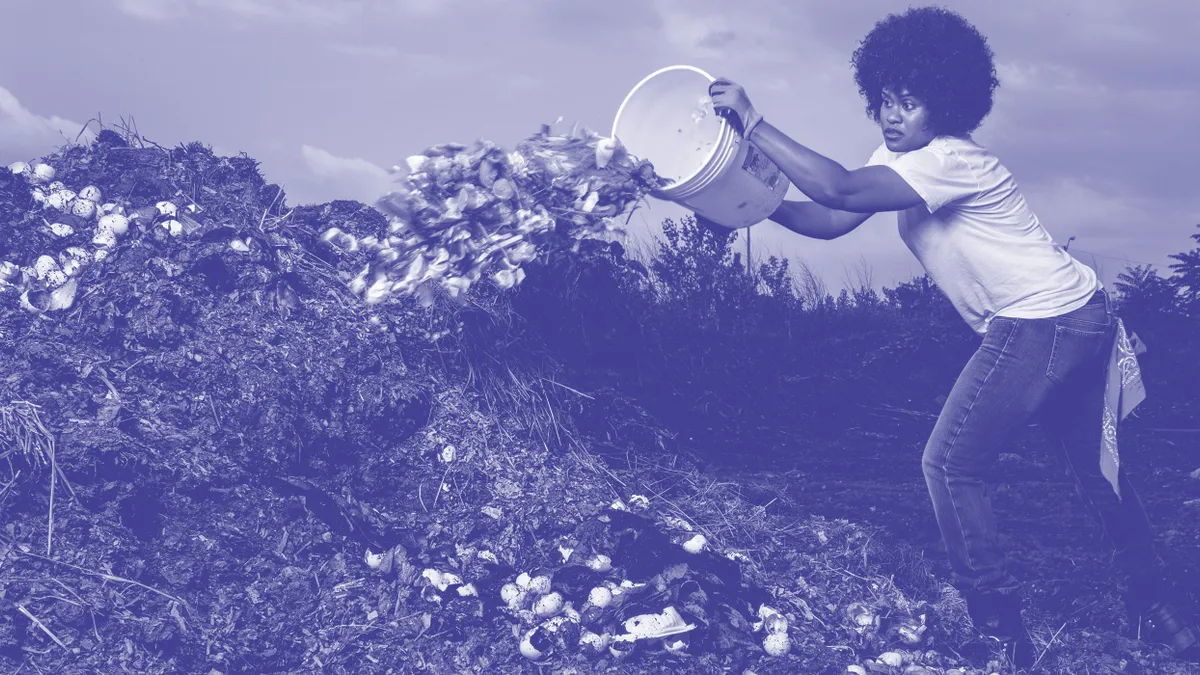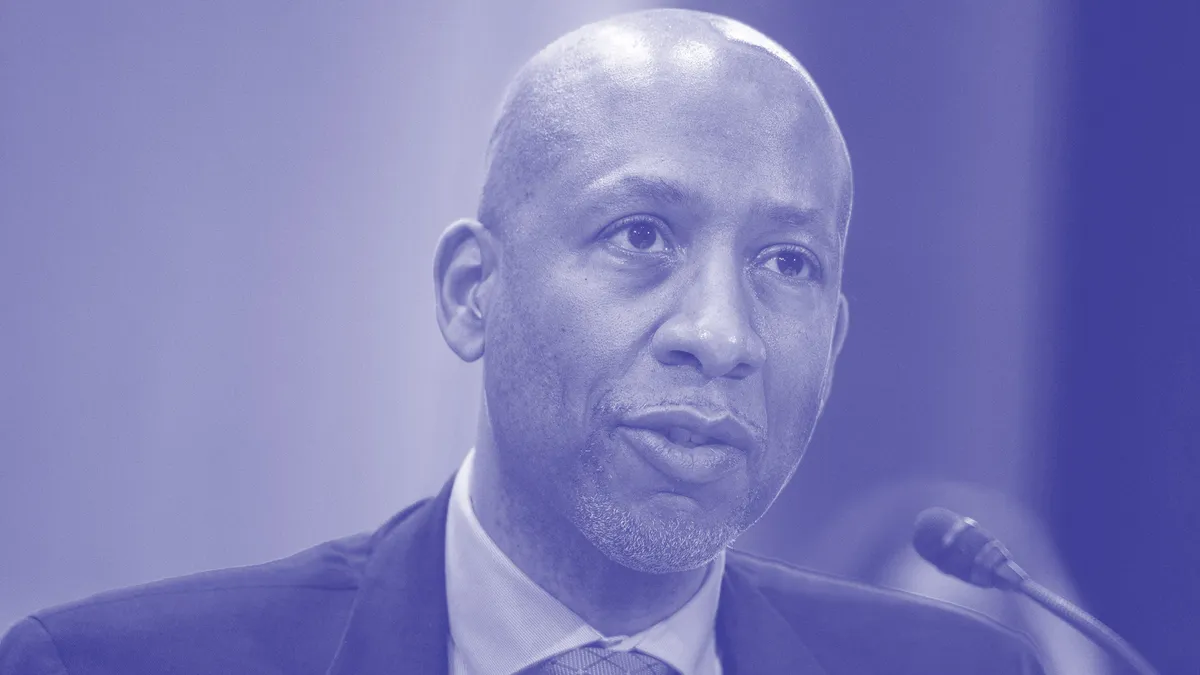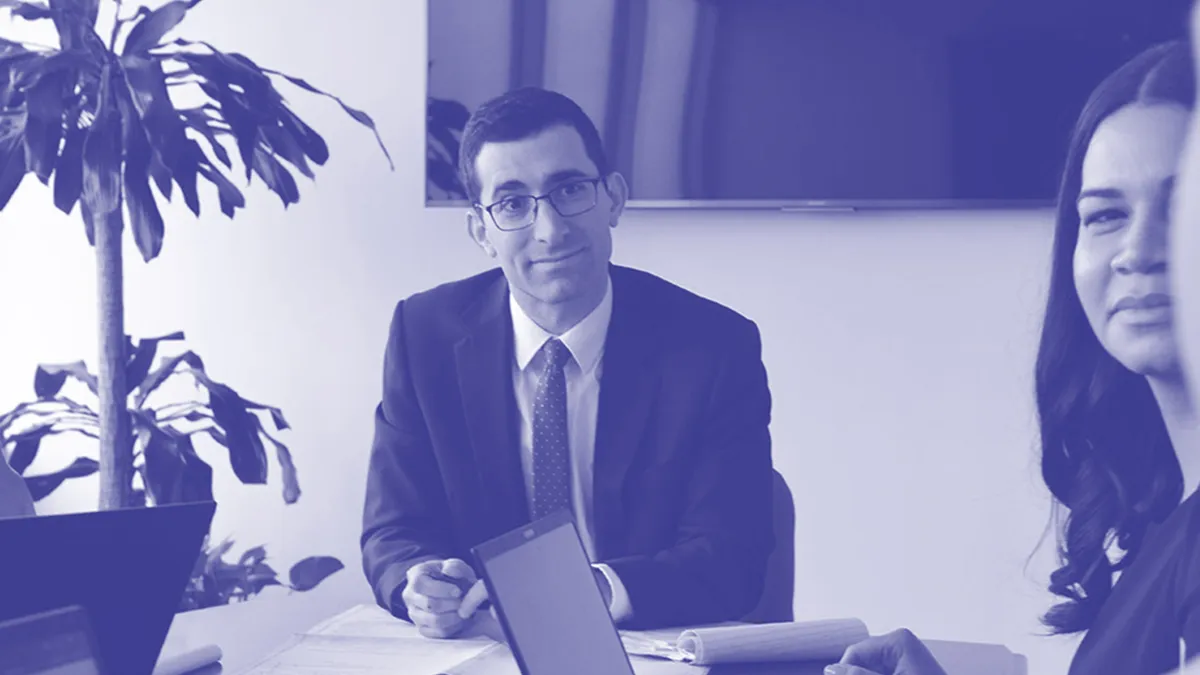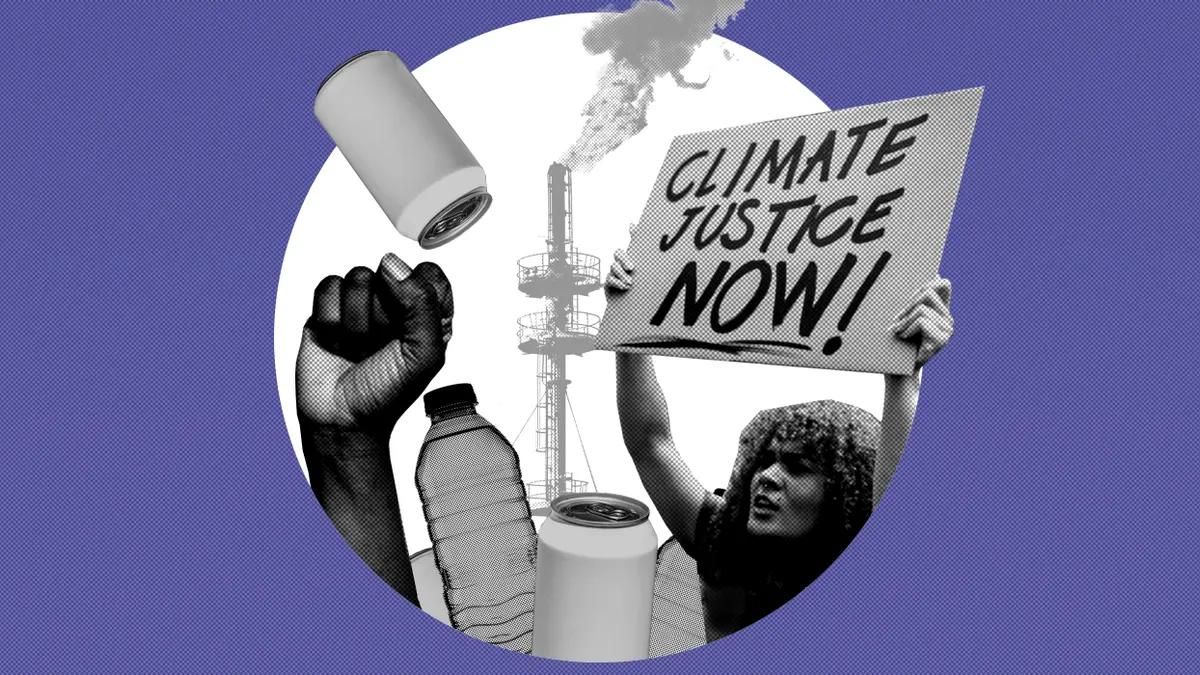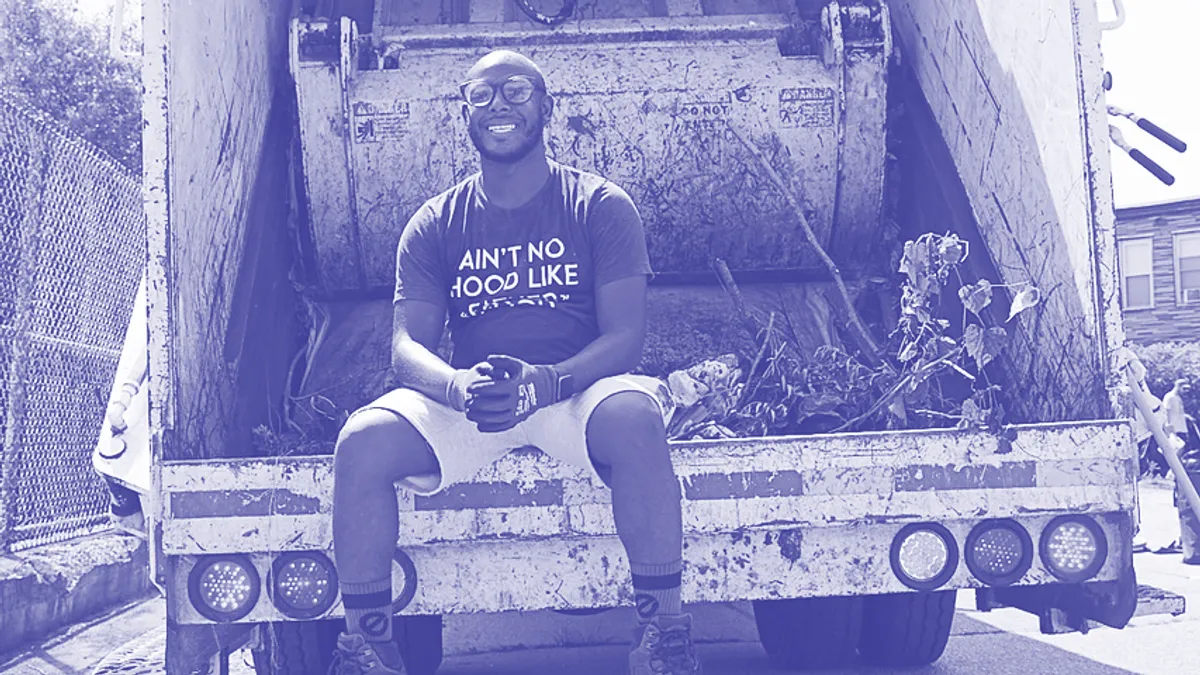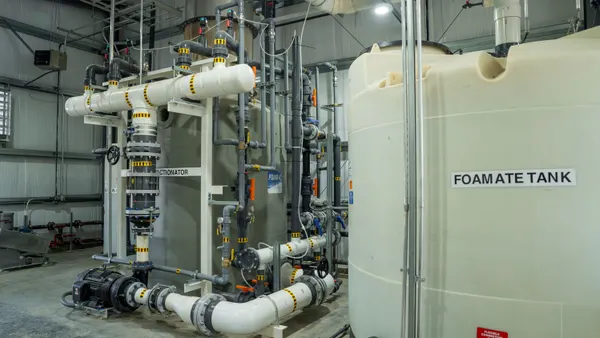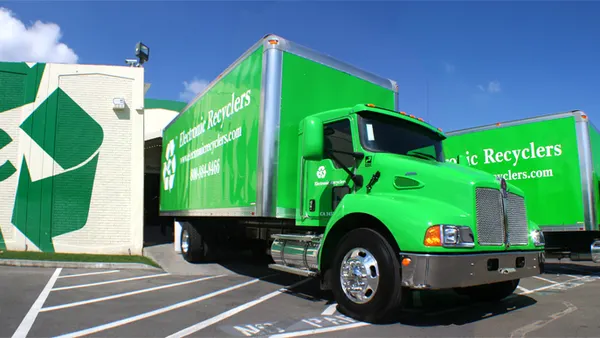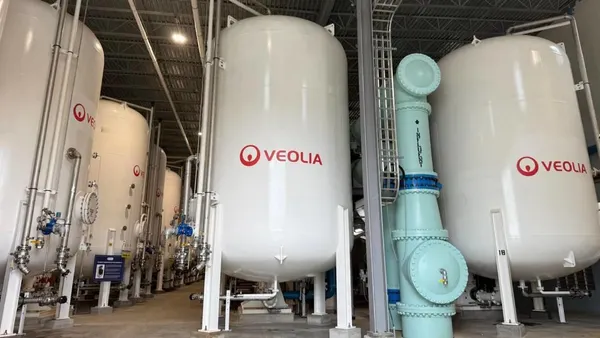Pashon Murray believes locally grown food and locally sourced compost make communities healthier. She’s made it her job for the last 12 years to build strong relationships between Detroit’s urban farmers and companies that might otherwise send their organic waste to the landfill.
In 2010 she co-founded Detroit Dirt, which gathers food waste from local coffee shops and breweries, businesses including General Motors and Blue Cross Blue Shield of Michigan, and the Detroit Zoo. Her work gained national attention in 2014, when she starred in a viral Ford commercial highlighting her efforts to keep food out of landfills.
Though composting is still a major part of her job, in recent years she has pivoted to do more consulting work with corporations to encourage them to make environmental justice a bigger part of their operations and their environment, social and governance planning.
Murray is now working to expand Detroit Dirt’s composting operations — which currently operate on a two-acre site flanked by industrial buildings and a highway in the middle of the city — and is involved in Detroit’s climate equity planning and its citizen advisory council, which is led by people of color and residents who live in areas of the city disproportionately affected by climate change. She also advocates for better waste infrastructure and innovation across the country: In February, she testified in front of the Senate Committee on Environment and Public Works in support of two recycling and composting infrastructure legislation bills.
Murray talked with Waste Dive about Detroit’s unique approach to the circular economy, the responsibility of corporations to make environmental justice efforts a daily practice, and her love for a well-balanced compost recipe.
This conversation has been edited for length and clarity.
You started Detroit Dirt in 2010 as a composting business, but a lot of your work also involves education, building community relationships and ESG consulting. You didn’t have a background in composting when you started. How did Detroit Dirt come about?
I grew up going to the landfills with my dad because he had a contract with the city and a county. Our family also had a farm in Mississippi, and I was able to witness my grandfather be one with nature. It was fascinating, as a kid, to watch him communicate with animals and just be this farmer who was so cool and calm. He had this deep understanding of the land. And so, between my dad and watching my grandfather, there were a lot of things that I've done since that were inspired by them.
Going to the landfill with my dad, he made me very aware of the waste stream. I always felt like discarding things, and really the landfills themselves, just didn't make any sense. As a child, I never knew at that time that I would be combating this issue as an adult.
Detroit has so much opportunity. When people or organizations or cities are going through an economic downturn, for me, that's opportunity. When I [moved to Detroit], the urban farming community in Detroit was becoming very innovative because there was a huge farming community in both the urban and rural areas. With Detroit Dirt, we created this composting model on a two-and-a-half-acre site right in the middle of the city. We already had a connection with the zoo because our co-founder [Greg Willerer] was an urban farmer, and he wanted to use some of their herbivore manure for his growing season.
The automotive community, around that same time, was regrouping and eventually going into bankruptcy. They used to have meetings about waste, and all of these corporations would show up to talk about the car’s steel, the plastics. There were farmers who grew soy that was used in the dashboards and the seats and people who recycled the oil filters. Everyone was focusing on building a more efficient vehicle and focusing on the waste.
A friend of a friend invited me to a dinner where we presented to companies in the community that were impacting Detroit so we could gain some momentum and support [for Detroit Dirt]. So I met John [Bradburn], a global waste reduction engineer for General Motors, and he happened to also be a farmer. I felt like, wow, there’s something there. Is it strange for the automotive community to talk about food waste?
My thought was, how do we get farmers or gardeners what they need locally? Because it defeats the purpose to bring in soil and certain materials from 40 miles outside the city. The zoo was only a few miles away. General Motors’ headquarters is, like, three or four miles away. So we wanted to prove that we could keep those resources within a lower carbon footprint and within a certain mile radius. General Motors has around 30 restaurants now in their headquarters, so we would pull up to the docking areas with trucks and trailers and fill them up.
That was the main focus [of Detroit Dirt] for the first 10 years, basically [we were] a lab that processed this food waste. I just wanted to prove that it could work, and that it could work with just basic equipment like trucks and tractors and backhoes. I didn't have the investment for an anaerobic digester.
It sounds like a lot of the stars aligned in the first few years to connect these groups within Detroit. What does your business look like today, working with companies on their ESG goals and having conversations about environmental justice in the process?
Yes, a lot of corporations have wanted to start paying more attention to waste reduction in the last few years. When the supply chains started getting strained, all the different, inefficient ways that companies were conducting business were revealed during the pandemic. I redirected and thought, I can focus on new ways of thinking and connecting people to a “waste-to-resource” mindset. I’m doing a lot of consulting where … I get calls from Fortune 500 companies that are, like, “it's time for us to address waste issues!” So many of these corporations are talking about CO2 and their carbon footprint these days.
Part of the strategy of a major corporation is its corporate social responsibility, and food waste is the low-hanging fruit. If you're a big corporation, and you feed thousands of people every day, and you're throwing away food, then that’s one area to focus on.
At the same time, I’m an environmental justice advocate. I've always been one. It’s one of the hats I wear when I lobby in DC or get invited to conferences, and that's what I present first and foremost. I think that a lot of corporations don't really want this heavy burden of going out into the community. They want to find the people who can take on that role for them. [Many] companies don’t invest in environmental justice until people like me come knocking on their doors.
It was a little bit more seamless with GM, because GM’s mindset was already zero-waste oriented. Not every company has that as a standard or goal. My job is to contact people in the community and get them to understand that [waste reduction] strategies connect to the broader community. At the end of the day, we also need small businesses, we need large companies, we need public-private partnerships, municipalities. We need all of us to support the work. It's just such a positive impact on the community when you can build those bridges.
With Detroit Dirt, we have always been small and grassroots. The funny thing about that is it gives you time to be very innovative and creative when you’re small because you have to! You don’t have access to millions of dollars.
What does the future look like for Detroit Dirt?
I probably would have about 10 composting sites and be working with as many companies as I possibly can, but instead I'm scaling slowly. This coming year I want to work more with the city on taking yard waste, and put a value on that by showing the diversion rate from landfills. I'm scaling, but I think the big companies, including the big waste companies, can do these things faster and need to do them faster.
In the future, I would like to work with more companies that value innovation and not the ones who are still just focused on dumping things in landfills. I'm in an automotive community and these companies produce trucks. It just makes sense for them to put trucks on the road that are energy efficient, especially when you can put material in an anaerobic digester and make fuel. It just makes sense to invest in these closed loop circular economies, locally, which make an impact globally. So I'm hoping the ways I continue to work over the next five or six years will impact and influence waste companies as well as transportation. It’s all connected.
You have also been involved with local government work such as Detroit’s Climate Equity Advisory Council. How do Detroit and Michigan approach environmental justice?
Some of Detroit’s city departments are beginning to shift and look to the future by thinking about how to better handle waste, runoff and regulations related to that. We have the Detroit Green Task Force [made up of environmental groups, nonprofits and others] to work on environmental policies and introduce green jobs, as well as an Office of Sustainability that are working together to make sure that best practices are implemented. The city started to work to make sure there were rules for the community composters, the mid-size and the industrial composters that all make sense for their operations. Even the governor is pushing for more sustainability and renewables, and we are starting to see that some companies are even thinking about composting themselves, or investing in certain related technologies.
I was part of the Climate Equity Advisory Council with other people of color from communities with different areas of expertise. The goal was to address equity in environmental justice, because we're a heavy industrial manufacturing community. You have to understand, our waste incinerator was just shut down a few years ago [after it exceeded emissions standards]. You have so many families who are impacted by that, either asthma or other issues. We have a huge oil refinery affecting all the residents around those communities. There’s been dumping over the years around the Great Lakes and the rivers, but we are seeing initiatives that can address the waterways as well. There's a resurgence of innovation around environmental justice.
What can other municipalities and companies learn from these strategies?
Environmental justice can be a part of corporate social responsibility, but environmental justice should also be the core of everything else. Often, you don’t hear people calling it by its name. It’s all about “equity, equity, equity.” You need to be promoting the term “justice,” the term “environmental justice,” around this work.
Lately there are more rallies, more people holding companies accountable. I'm getting a lot of emails now about rallies or community information sessions or town hall meetings. Local politics is great. That’s the core of getting to know your neighbors, making sure that you're holding hands and you're communicating with the company that's smack dab in the middle of a community or residential area. Detroit is a huge city for mobilizing community organizations, and we also have a lot of unions. As far as around environmental justice, that's something they eat, sleep and breathe because we have all these oil refineries and all this car manufacturing.
Closing the incinerator took years, and it took a bunch of organizations rallying together trying to get investment and campaigns and pushing out data to show how it was impacting people's health. We have so many responsibilities as citizens in this country. It's hard for someone to really take the time outside of our daily activities and obligations and responsibilities to focus on these things. But when corporations come in, they should be putting the community first and talking with them. When ABC company tells me they don't have any relationships in their community, it’s just like, how do you not build that bridge? Some are not accountable. Some want to be, but don’t yet have a strategy in place to be accountable to the community.



